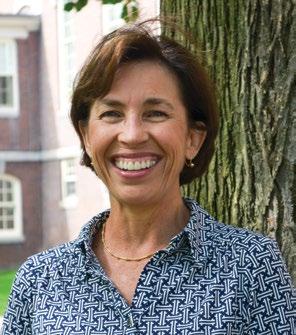For my part, I first remembered lyrics of a spiritual “My Soul is a Witness,” which asserts that the honest life one has led sets forth an example that is a testament to God’s grace. And while much of the school’s current ethos stems from Moses’ venerable later years, his conversion to Quakerism and commitments to abolition and equal education for the sexes, our team unearthed documents, many in his own hand, that would cast him and his school onto a much more complex spectrum: Moses the slaveholder, Moses the aid worker, Moses the flawed but atoning founder of an institution built on the aspirational epithet “For the Honor of Truth.”
EDITOR’S LETTER
Witnessing History When Matt Glendinning reached out to me this past fall asking if I’d be involved in an exhibit of objects documenting the history of MB, I couldn’t say yes fast enough. While I was a student, I always had a vague sense of the school’s deep-rooted history from the oil paintings in Alumni Hall and the stories told by long-serving faculty members. But now, as a trained archivist with professional experience under my belt and the mandate to delve into the school’s rare materials, I could be a part of the effort building a solid display of research for the education and edification of the entire MB community. During the research process, I, along with other members of the exhibit team, took a trip to the Special Collections at UMass Amherst where, in combing through three boxes of Moses Brown’s materials, we came upon one phrase again and again: Witness My Hand. This was a standard phrase used during Moses’ time to officiate hand-drawn, legally-binding documents, but immediately, we began to ponder a wider interpretation of these three words. 8
Holding a document in my own hands that was written in Moses’ hand that coldly listed the first names and prices of human beings stirred up such contradictory gravitas while reckoning it with the image of the benevolent, visionary old Quaker. Reading through official school histories delineating how “both sexes were entitled to an education; but boys and girls were to be kept strictly apart,” somehow had to square with my own experience of learning and socializing with my male classmates unselfconsciously. Moses Brown’s own painful and redemptive truth is the school’s truth, and more importantly, our truth. We are the ones left to witness, as completely as we can through the inherent lens of our modern mores of Black Lives Matter, #MeToo, and general “woke-ness,” everything Moses Brown’s hand began: to fully survey, fairly examine and honestly reconcile the truth of our school.
Sarah Lindblom ’07 joined MB in ninth grade. She says her advisor Jamie German was the perfect ‘constant’ in her fouryear high school experiment and says Moses Brown taught her to be disciplined, resourceful, critical and ambitious; she appreciates MB’s combination of care and challenge, critical examination and creative thinking. Sarah started her career in archives as a student assistant in the archives and special collections at Smith College. After majoring in Classical Studies and Dance, she obtained her MLIS at the University of Maryland, concentrating in archives. She’s also worked at the Rhode Island Jewish Historical Society, Rhode Island Historical Society and Library of Congress and is passionate about seeing MB’s archives become an accessible educational resource for the school and larger community. CUPOLA









